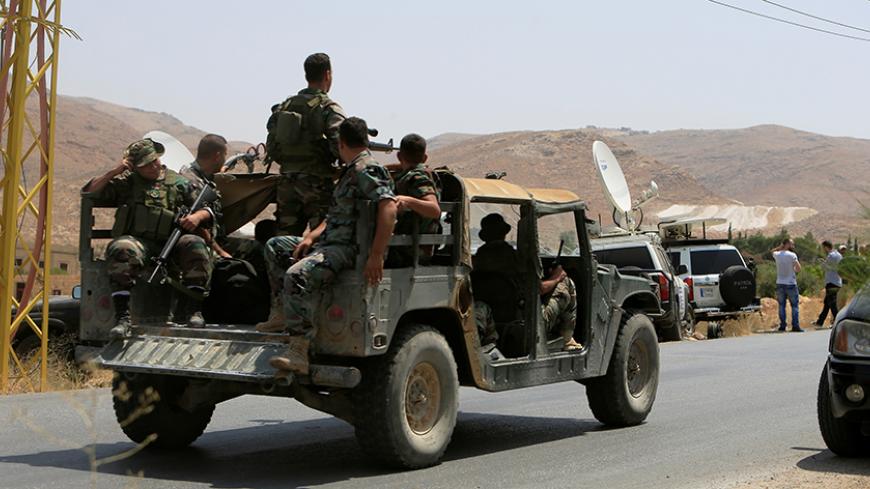BEIRUT — On July 24, Judge Saqr Saqr, the state commissioner of the Lebanese military court, received the report of the medical committee, which was tasked with investigating the death of four Syrians while in custody. They are identified as Mustafa Abd el-Karim Absse, Khaled Hussein el-Mleis, Anas Hussein el-Husseiki and Othman Merhi el-Mleis.
The four were among hundreds of people arrested during army raids on Syrian refugee camps in Arsal that started on June 30 and are aimed at what the army describes as capturing “terrorists.” In the report, the committee of three doctors said the deaths were not the result of violence but of different health problems that led to their immediate death following the arrest.
The autopsy report of the four Syrian detainees concluded that one of the detainees died of a sudden heart attack, while a second died of pneumonia, a third of climate shock and substance abuse and a fourth of emphysema.
The report of the Lebanese military judiciary comes after several parties, most notably the Lebanese government and Prime Minister Saad Hariri, called for a thorough and transparent investigation into the cause of death of the four Syrians amid suspicions that the Lebanese army was behind their death.
However, the report was not warmly welcomed by the lawyer of the four detainees. Diala Chehade had confirmed in a July 7 Facebook post that prior to their detention the detainees were in good health before their bodies were returned with clear signs of torture.
She had gotten the judiciary’s approval to have body samples examined at the Hotel-Dieu de France hospital in Beirut, but she said it was not long before the Lebanese army intelligence confiscated the samples.
Chehade noted in her post that it is “a divine miracle for three people whose families and friends said were in perfect health to suddenly die less than 48 hours into their arrest by the same party in two hospitals run by the government from natural causes.” The fourth Syrian died in a government hospital in Beirut.
After Saqr received the medical committee report, Chehade reiterated her words in an interview with Al-Monitor. She said that the Beirut Bar Association has prevented her from discussing any details relating to this issue in the media, although Article 39 of the Code of Ethics of the law profession allows the discussion of major issues that are of interest to the community in the media.
At a time when the bar’s decision prohibited tackling any details related to the case, the military prosecution leaked excerpts of its report to the media, thus confusing public opinion and preventing it from knowing the truth behind the death of the four Syrians.
In this context, Human Rights Watch said in a July 20 report that the forensic pathologists’ conclusion that the death of the four Syrians was not the result of violence raises many questions, especially as photographs of the bodies showed signs of torture.
Asked about the military judiciary’s report, Bassam Khawaja, a researcher at the Lebanon office of Human Rights Watch, told Al-Monitor, “The Lebanese authorities should publish the full investigation in the media, the issue being of interest to public opinion, and hand over the full copies of the investigation to the four families. The photographs of these detainees show injuries and signs of physical torture, and any claim that their deaths were caused by natural causes would be inconsistent with these photos. The only way to reach a solution is to publish the full investigation because a brief statement [thereon] is insufficient. The Lebanese people and the families of the victims deserve to know the full story of what happened in this case.”
Asked to comment on the controversy resulting from this incident, a Lebanese military source told Al-Monitor on condition of anonymity, “What happened on June 30 is very serious, as four suicide bombers were found and four bombs were detected [during the army’s raids], which means eight possible bombings could have occurred anywhere in Lebanon, had the army not carried out its pre-emptive operation. Three hundred and fifty-six Syrians were arrested [during the raids] and were moved to a building of the Rayak air base in Zahle for interrogation, while 15 of them were hospitalized at the Zahle and Beirut government hospitals.”
The source added, “On July 1, one of those arrested died in Zahle before the interrogation had started. That same afternoon, two others also died in Zahle. Subsequently, and due to their overcrowding in one building, 165 of the detainees were taken to eight different locations, including the Directorate of Intelligence in the south and the north. Another detainee died in the emergency department of the government hospital in Beirut. The four bodies were medically examined under the supervision of the judiciary, and the forensic pathologists reported that none of them had been subjected to any torture.”
The defense team of the four deceased detainees insists on receiving a copy of the full investigation to be able to take the appropriate measures. Meanwhile, human rights organizations such as Amnesty International continue to demand the full disclosure of the circumstances behind the death of the four detainees. Thus, the question arises as to why the military leadership and the military judiciary only leaked excerpts from the investigation of the medical committee when the deaths are reportedly the result of health problems. The issue will continue to worry the legal community and the Lebanese public opinion so long as the investigation is not fully released.





